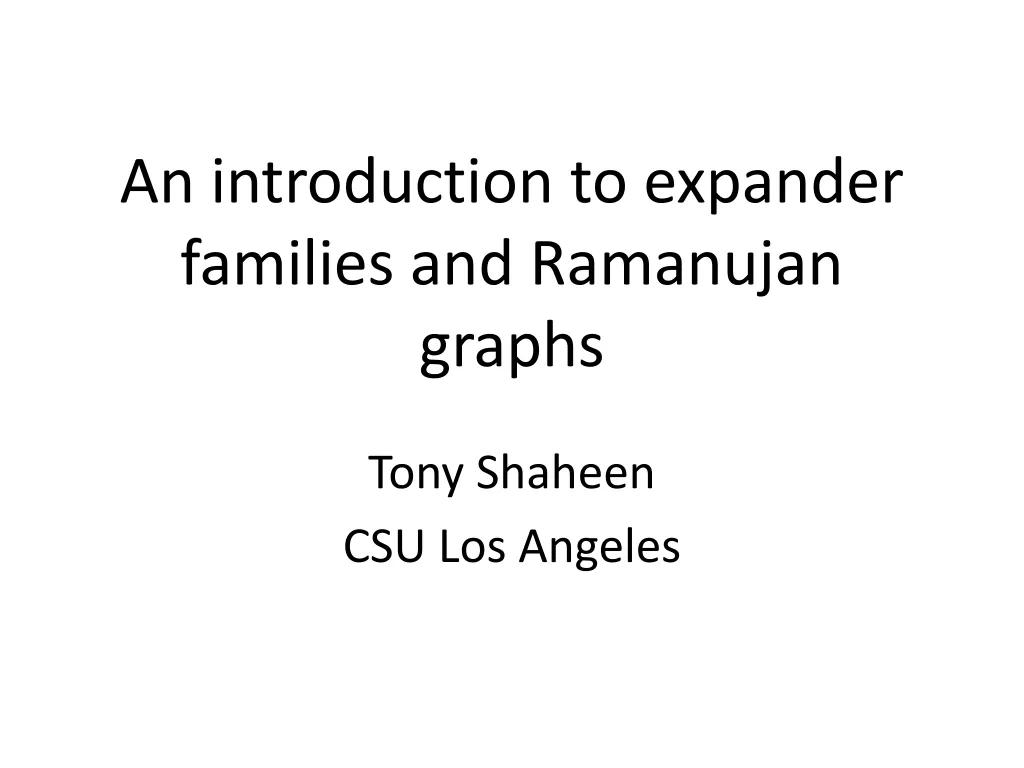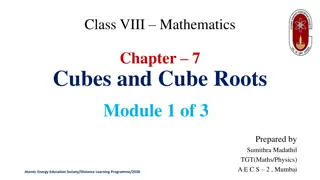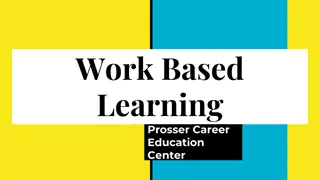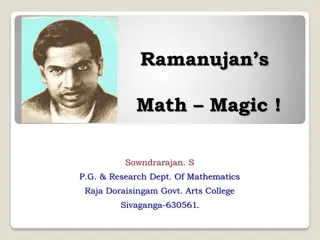Career Development Insights for Students at Ramanujan College of Management, Palwal
Offering a warm welcome to students and sharing over 35 years of corporate experience, this content emphasizes the importance of self-drive, skill development, and continuous learning in today's dynamic career landscape. It discusses key career challenges, the significance of commitment and competence, and highlights the need for a skilled workforce in India. Inspirational quotes from prominent figures underscore the value of youth and skill development for a successful future.
Download Presentation

Please find below an Image/Link to download the presentation.
The content on the website is provided AS IS for your information and personal use only. It may not be sold, licensed, or shared on other websites without obtaining consent from the author.If you encounter any issues during the download, it is possible that the publisher has removed the file from their server.
You are allowed to download the files provided on this website for personal or commercial use, subject to the condition that they are used lawfully. All files are the property of their respective owners.
The content on the website is provided AS IS for your information and personal use only. It may not be sold, licensed, or shared on other websites without obtaining consent from the author.
E N D
Presentation Transcript
A WARM WELCOME TO STUDENTS OF RAMANUJAN COLLEGE OF MANAGEMENT- PALWAL 30TH SEPTEMBER, 2016 https://kamleshsujata.wordpress.com IF YOU WANT TO FLY HIGH- LIKE AN EAGLE, YOU NEED TO BE SELF DRIVEN 1
ABOUT ME OVER 35 YEARS OF CORPORATE CITIZENSHIP S.NO NAME OF COMPANY INDUSTRY 1. MAHINDRA & MAHINDRA LTD AUTOMOBILES, FARM MACHINERY & SPARE PARTS 2. MAHINDRA SHUBH LABH SERVICES LTD AGRI BUSINESS & CONTRACT FARMING 3. ESCORTS LTD AGRI BUSINESS, CONTRACT FARMING & GENSET 4. RELIANCE INDUSTRIES & RETAIL RURAL HUBS, RURAL RETAIL, WHOLESALE AND URBAN RETAIL 5. FUNCTIONAL MAINSTAYS: SALES & MARKETING, OPERATIONS, PROJECTS & START UPS. WORKED IN MAJOR CITIES ACROSS INDIA AT SENIOR LEVELS AND ACROSS FUNCTIONS. WRITER AND BLOGGER EMAIL: shravancharitymission@gmail.com https://kamleshsujata.wordpress.com PUBLICATIONS SAS MOTORS LTD POWER TILLER AND E-RICKSHAW NOTHING HAPPENS BY CHANCE YOU NEED TO WORK FOR IT 2
CONTENT SKILL DEVELOPMENT-THE MODERN DAY VIRTUE SKILL BUILDING CONTINUOUSSKILL BUILDING LATEST MANTRA FOR CAREER ENHANCEMENT 3
THE FOUR CIRCLES Learn Implement Innovate Training-is key CORE CAREER MESSAGE 4
CAREER CHALLENGES DYNAMIC ENVIRONMENT FAST PACE OF TECHNOLOGY FORCE MEAJURE ENGLISH LANGUAGE TRANSPARENCY FAST PACE OF LIFE BUSINESS LAWS & TAXES GLOBAL REACH EXCELLENCE GLOBAL COMPETITION ENVIRONMENT ISSUES CONTINUOUS TRAINING POLARISED SOCIETY TO BE MULTI SKILLED DISTANCE MULTI TASKING SPREAD OF INDUSTRIES SMART WORKING INTELLECT & FIELD MOBILITY CHALLENGES ARE FOR EVERYONE BUT WINNERS ARE FEW 5
COMMITMENT >>>COMPETENCE CHART COMMITMENT C O M P E T E N C E (LCLC) (HCLC) LOW COMMITMENT LOW COMPETENCE HIGH COMMITMENT LOW COMPETENCE (LCHC) (HCHC) LOW COMMITMENT HIGH COMPETENCE HIGH COMMITMENT HIGH COMPETENCE ALWAYS TRY AND BE HERE NEVER BE IN LCLC-TRY AND BE IN HCHC 6
QUOTES We are a youthful nation. Our youth are our strength. The world and India need a skilled workforce - Rajiv Pratap Rudy- Honorable Union Minister of State for Skill Development and Entrepreneurship
WHAT IS SKILL DEVELOPMENT? Skill development is the process of (1) identifying your skill gaps, and (2) developing and honing these skills. It is important because your skills determine your ability to execute your plans with success. Imagine a carpenter trying to build a house. SKILL DEVELOPMENT HELPS YOU PERFORM YOUR TASK EFFICIENTLY BY COVERING GAPS
WHY SKILL DEVELOPMENT? Wide gap between what is taught in academia and what is required by the industry. Indian job market likely to be very crowded in times to come and that will warrant export of skilled manpower. About 12 million persons are expected to join the workforce every year. Skill India is therefore a campaign launched by Prime Minister Narendra Modi on 15 July 2015 with an aim to train over 40 crore (400 million) people in India in different skills by 2022. It includes various initiatives of the government like "National Skill Development Mission", "National Policy for Skill Development and Entrepreneurship, 2015", Pradhan Mantri Kaushal Vikas Yojana )PMKVY) and the "Skill Loan scheme. WE HAVE GRADUATES, POST GRADUATES & EVEN MBAs IN INDIA- BUT THEY ARE UNEMPLOYABLE
SALIENT FEATURES OF SKILL INDIA FOCUS ON CREATING EMPLOYMENT AVENUES EITHER THROUGH JOBS OR SMALL PRIVATE ENTERPRISE. Rural India Skill is another milestone of this programme that concentrates on various trades life farm machinery, agri- inputs, dairy, poultry , veterinary services to name a few. Scope of urban entrepreneurship in various trades like gems & jewelery, automobile, banking, retail sales, tailoring, sewing operations and so on. machine Domain and non domain training through pedagogy like industry tour, games, group discussions (GDs), brainstorming sessions, simulation games, case- based discussions (CBD), question-based discussions (QBDs), face to face (f2f), lab exercises etc. A SKILLED PERSON STANDS A BETTER CHANCE OF GETTING A JOB OR STARTING AN ENTERPRISE
DIFFERENCE BETWEEN TALENT AND SKILL Talent is your innate ability to do something. It is your natural ability which is inborn. Skill is a learnt ability. It is acquired or developed after you put in a lot of time and hard work. Will Smith is an American actor, producer, rapper, and songwriter. In April 2007, Newsweek called him "the most powerful actor in Hollywood . Smith has been nominated for five Gplden Globe Awards and two Academy Awards, and has won four Grammy Awards. TALENT AND SKILLS ARE POLES APART YET THEY COMPLEMENT EACH OTHER
DIFFERENCE BETWEEN TALENT AND SKILL SKILLS CAN BE ACQUIRED YOU ARE A SALESMAN BUT YOU DON T KNOW HOW TO DRIVE A BIKE. EXAMPLES OF NATURAL TALENT SINGING YOU ARE ACCOUNTANT BUT YOU DON T KNOW HOW TO RUN A XL SHEET. ACTING DANCING YOU ARE AN MBA BUT YOU DON T KNOW HOW TO CONVERSE IN ENGLISH. BATTING YOU ARE AN ENGINEER BUT YOU DON T KNOW HOW TO EXECUTE A WORKSHOP MANUAL. BOWLING YOU RE A TEACHER WITHOUT PUBLIC SPEAKING ABILITIES. SPORTS WRITING YOU ARE GRADUATE BUT NOT EMPLOYABLE. TALENT IS INBORN, SKILLS CAN BE ACQUIRED
USP OF SKILL INDIA The main concept is to enhance confidence, improve productivity of the youth through up skilling, new skilling and re-skilling. So that they get blue-collar jobs in order to get a better life & respect in the society. It has now become a priority to conceptualize Right to Skills along with Right to Education. Even if they won t succeed in traditional education, they will be skill independent without any further investment of time & money, on skills. With this, the youth will not deviate from mainstream to negativity. SKILL BUILDING IS THE ONLY SURVIVAL MANTRA IN THIS DAY AND AGE OF RAPID CHANGE OF TECHNOLOGY, COMPETITION AND MOBILITY
SKILL INDIA-OPPORTUNITIES ABROAD EVERY 3RD PERSON IN THE WORLD IS EITHER FROM INDIA OR CHINA > 12 MILLION JOBS REQUIRED IN INDIA EVERY YEAR MANY COUNTRIES WITH HUGE LAND ASSETS/ AGING OR LOW POPULATION TO NAME A FEW: -CANADA -RUSSIA -JAPAN -AUSTRALIA -GERMANY CHINA 1.35 BILLION SKILLED WORKERS WORLD POPULATION 7.4 BILLION INDIA 1.25 BILLION HUGE OPPORTUNITIES EXIST IN THESE COUNTRIES FOR SKILLED PEOPLE PRESSURE OF EMPLOYMENT MOUNTING ON INDIA AND CHINA- WAY OUT >> EXPORT OF SKILLED MANPOWER
SHIFT IN LEARNING METHODS MOVIES & DOCUMENTARIES PERIODICALS & JOURNALS MAGAZINES BOOKS FACE-TO FACE E-LEARNING VIDEOS DIGITAL-SOCIAL MEDIA MODERN WAYS TRADITIONAL LEARNING LEARNING HAS BECOME A CONTINUOUS PROCESS
WHAT IS SKILL DEVELOPMENT IN THE INDUSTRY CONTEXT? To help address the enormous gap that exists between skills needed by the Indian industry and what academia is producing, and the resultant deep fracture in the talent supply chain for entry level mid-skill jobs. BRIDGING THE GAPS HELPS-ATTITUDINAL FLEXIBILITY IS THE KEY
SKILL DEVELOPMENT IN INDUSTRY PERSPECTIVE There is need to supercharge traditional ways of doing vocational training using text books and labs by flipping the classical classroom education into learner-centric engagement models like demonstration & communication videos, modular e-Lessons, games and simulations, interactive learning, hands-on practice with peer learning, digital assessments and peer cum blended learning. These learner-centric models will enable massive deployment through an anytime, anywhere technology platform creating Massively Open Online Courses (MOOCs) for jobs in the form of modular online content for bridging the gap between the skills acquired in high schools and community colleges, and those required in performing jobs. MANY WAYS OF DOING THROUGH COURSES OR E-LEARNING
SKILL DEVELOPMENT TRHOUGH POWERFUL CATALOGUES The shift for better understanding of students would be through powerful catalogues speaking more of digital language than standard text books as the courses are designed mainly for college drop outs and lowly qualified. POWER FUL CATALOGUES AN EASY WAY TO UNDERSTAND
SKILL DEVELOPMENT WORKSHOPS DIVERSITY OF SKILL DEVELOPMENT WORKSHOPS
ROLE OF MINISTRY OF SKILL DEVELOPMENT AND ENTREPRENEURSHIP It is responsible for co-ordination of all skill development efforts across the country. Removal of disconnect between demand and supply of skilled manpower. Building the vocational and technical training framework. Skill up-gradation, building of new skills & innovative thinking not only for existing jobs but also jobs likely to be created. The Ministry aims to skill on a large scale with speed and high standards to achieve the vision of Skilled India. It is aided in these initiatives by its functional arms National Skill Development Agency (NSDA), National Skill Development Corporation (NSDC), National Skill Development Fund (NSDF) and 33 Sector Skill Councils (SSCs) as well as 187 training partners registered with NSDC. The Ministry also intends to work with the existing network of skill development centres, universities and other alliances in the field. Further, collaborations with relevant Central Ministries, State governments, international organizations, industry and NGOs have been initiated for multi-level engagement and more impactful implementation of skill development efforts. ---- UMBRELLA ROLE OF THE MINISTRY----
SECTOR WISE LEVEL OF EDUCATION IN INDIA HIGH LEVEL OF ILLITERACY IN AGRI-ALLIED AND NON-MANUFACTURING SECTORS HIGHEST LITERACY LEVEL IN SERVICES SECTOR
SECTOR WISE EMPLOYMENT STATUS IN INDIA ABSOLUTE INCREASE IN EMPLOYMENT (IN MILLIONS) 2005-05 TO 2009-10 EMPLOYMENT ACROSS VARIOUS SECTORS 1999-00 (MILLIONS) EMPLOYMENT ACROSS VARIOUS SECTORS 2004-05 (MILLIONS) EMPLOYMENT ACROSS VARIOUS SECTORS 2009-10 (MILLIONS) PERCENTAGE GROWTH/DECLINE AGRICULTURE 237.67 258.93 244.85 -14.08 -5% MANUFACTURING 44.05 55.77 50.74 -5.03 -9% NON-MANUFACTURING 20.84 29.96 48.28 18.32 61% SERVICES 94.2 112.81 116.34 3.53 3% TOTAL 396.76 457.46 460.22 2.76 1% Agriculture is one sector which is showing a steep decline in employment status. Analyzing the current status of agriculture employment where most people have received no formal education or training and farmers are most willing to shift to other professions. It is imperative for the industry to strongly develop skills and resources to survive, adapt and grow. AGRICULTURE SHOWS A DECLINE
COMMON VOCATIONAL COURSES o Mobile repair o TV & white goods repair o Textile printing o Office skill management o Paper bag & envelope making o Paper cycling o Clay modeling o Baking o Computer learning o Home management o Candle making o Stationery production o Greetings cards oTailoring o Gardening o Agriculture o BFSI o Food Processing o IT-ITES o Retail o Tourism & Hospitality o Apparel o Capital Goods o Furniture & Fittings o Leather o Security o Green Jobs o Automotive o Construction o Gems & Jewellery o Life Science o Telecom o Beauty & Wellness o Electronics o Healthcare o Plumbing o Textile VOCATIONAL COURSES TO UPGRADE SKILLS
CONCERNS IN SKILL TRAINING AND INDUSTRIALIZATION INDIA CURRENTLY FACES A SEVERE SHORTAGE OF WELL- TRAINED SKILL WORKERS PERCENTAGE OF WORKFORCE THAT HAS UNDERGONE SKILL TRAINING S.NO COUNTRY % 1 2 3 4 5 6 India U.K. Germany USA Japan Spouth Korea 2.3 68 75 52 80 96 SKILL TRAINING HAS A DIRECT CORELATION WITH DEVELOPMENT SKILL TRAINING HAS A DIRECT CO-RELATION WITH DEVELOPMENT
CHALLENGES IN SKILL DEVELOPMENT The greatest concern is ensuring ground level implementation of skill policy at a break neck, speed due to lack of awareness in almost all partners. Skilling is deemed to be the final destination for those drop outs that couldn t succeed in academics. Convincing blue chip companies to appoint skilled manpower is another bottleneck, because of the stability issue, and obsolete curriculum not adhered to by the industry standard. Hence we need to create jobs across the universe instead of sticking to local requirements. traditional SKILL DEVELOPMENT HAS MULTIPLE CONCERNS
CHALLENGES IN SKILL DEVELOPMENT? The hardest task is sourcing & creating a pool of competent, knowledgeable and certified-Trainers who are ahead of time and know the sentiments of the policy, people & the press. The target group to whom training is to be imparted is unaware about the SWOT analysis of the industry as well as future growth prospects. Rapid change in industrial technology is almost moving at global speed. Local constituents and conditions are therefore unable to match that. And because of this it is not feasible to keep up with industrial pace. KEEPING UP TO TIME A BIG CHALLENGE
HARD FACTS-1 According to 2013 estimates, India s labour force is 500 million strong. However, over 90% of this workforce works in unincorporated, unorganised enterprises with no formal skill development training. Lack of formal vocational for large segments of this population leads to poor efficiency and productivity, low income level and workforce inertia, hindering economic evolution. By 2026, around 64% of the India s population will be in the working age group of 15-59 years. This rich demographic dividend can be leveraged if India redesigns its Education and Skill Development strategies with a clear road Map. On the contrary , we are unable to adequately address the dual challenges of educating the masses and imparting employability skills, this potential demographic dividend can turn into a demographic disaster. THE CHALLENGE IS DUAL- EDUCATING AND EMPLOYABILITY
HARD FACTS-2 Due to lack of formal education and skills, there is an influx of unskilled labour from the rural areas to towns and cities which adds significant pressure on the urban infrastructure, environment as well as rural livelihoods. The seasonal migrant labour population of India is estimated to be as high as 100 million. The issues and challenges faced by the Education system is multi- faceted and must be understood through School, Higher education and Skill Development. SKILL DEVELOPMENT WILL PROVIDE STABILITY IN AIMLESS MOVEMENT OF MIGRANT POPULATION
HARD FACTS-3 In the next decade or so India will have a surplus manpower of 4-5 crore. Therefore a great need to provide this youthful manpower with skills and ability to tackle global challenges. While, in the 20th century the IITs made a name for themselves globally, now in the 21st century it is the (Industrial Training Institutes) that will acquire global recognition for producing quality skilled manpower. There is constant need for updating training programmes and syllabi. NEW ITIs WITH MODERN VISION NEED TO BE LAUNCHED
HARD FACTS-4 India currently faces a severe shortage of well-trained, skill workers. We must focus on scaling up skill training efforts to meet the demands of employers and drive economic growth. More than 54% of the country s population is below the age of 25 allowing it with an opportunity to provide a skilled workforce to fill the expected shortfall in the ageing developed world. The country s population pyramid is expected to bulge across the 15-59 age group over the next decade. This demographic advantage is predicted to last only until 2040. India therefore has a very narrow time frame to harness its demographic dividend and to overcome its skill shortages. SIZEABLE OPPORTUNITY WAITING FOR YOUNG INDIANS ABROAD
ACHIEVEMENT IN SKILL DEVELOPMENT? THE MOVING WHEEL OF INDIA
A TYPICAL GOVERNMENT ADV ON SKILL DEVELOPMENT INVITING APPLICATIONS
ACTIVITIES UNDERTAKEN BY THE NSDA THE BOX OF ACTIVITIES
ROLE OF MINISTRY OF SKILL DEVELOPMENT AND ENTREPRENEURSHIP 34
MAIN OBJECTIVES OF NSDC Upgrade skills to interest standards through significant industry involvement To develop necessary frameworks for standards, curriculum and quality assurance OBJECTIVES Enhance, support and coordinate private sector initiatives for skill development through appropriate Public-Private-Partnership (PPP) models. Prioritise initiatives that can have a multiplier or catalytic effect as opposed to one-off impact. Play the role of a market- maker by bringing financing, particularly in sectors where market mechanisms are ineffective or missing FIVE OBJECTIVES OF NATIONAL SKILL DEVELOPMENT CORPORATION
THE NATIONAL SKILL DEVELOPMENT CORPORATION INDIA (NSDC) The National Skill Development Corporation India (NSDC) was setup as a one of its kind, Public Private Partnership Company with the primary mandate of catalysing the skills landscape in India. NSDC is a unique model created with a well thought through underlying philosophy based on the following pillars: Enable: the creation & sustainability of support systems required for skill development. This includes industry led Sector Skill Councils Create: Proactively catalyse creation of large, quality vocational training institutions. Fund: Reduce risk by providing patient capital, including grants and equity. STANDING ON THREE PILLARS
OBJECTIVE OF NATIONAL POLICY ON SKILL DEVELOPMENT & ENTREPRENEURSHIP, 2015 To meet the challenges of skilling at a scale with speed and standard (quality) To provide an umbrella framework to all skilling activities being carried out within the country, to align them to common standards and link the skilling to demand centres. In addition it ll lay down the objectives and expected outcomes. The effort will also be to identify various institutional frameworks that can act as the vehicle to reach expected outcomes. It will also provide clarity and coherence on how skill development efforts across the country can be aligned within the existing institutional arrangements. The policy will also link skill development to improved employability and productivity. MULTI PRONGED STRATEGY
ROLE OF MINISTRY OF SKILL DEVELOPMENT AND ENTREPRENEURSHIP National Policy on Skill Development and Entrepreneurship 2015 Ministry is an integral part of the government policy on "Sabka Saath, Sabka Vikaas." Its commitment is to overall human resource development to take advantage of the demographic profile of our country's population in the coming years. Developing a comprehensive and holistic policy document is an integral part of the process. This requires a fresh look at the already existing National Policy on Skill Development (NPSD), 2009. ----UMBRELLA ROLE OF THE MINISTRY----
PARTNERSHIPS OF NSDC NSDC operates through partnerships with multiple stakeholders in catalysing and evolving the skilling ecosystem. Private Sector Areas of partnerships include awareness building, capacity creation, loan financing, creation and operations of Sector Skill Councils, assessment leading to certification, employment generation, Corporate Social Responsibility, World Skills competitions and participation in Special Initiatives like Udaan focused on J&K. Central Ministries Participation in flagship programmes like Make in India, Swachh Bharat, Pradhan Mantri Jan Dhan Yojana, Smart City, Digital India and Namami Ganga, among many other. State Governments Development of programs and schemes, alignment to NSQF and capacity building, operationalisation of program, capacity building efforts among others. International Engagement Investments, technical assistance, transnational standards, overseas jobs and other areas. University/School systems Vocationalisation of education through specific training programs, evolution of credit framework, entrepreneur development, etc. Non-profit organizations Capacity building of marginalized and special groups, development of livelihood, self-employment and entrepreneurship programs. Innovation Support to early-stage social entrepreneurs working on innovative business models to address gaps in the skilling ecosystem, including programs for persons with disability. PARTNERING APPROACH
NATIONAL SKILL DEVELOPMENT AGENCY (NSDA) National Skill Development Agency (NSDA) The National Skill Development Agency (NSDA), an autonomous body, (registered as a Society under the Society's Registration Act 1860) was created with the mandate to co-ordinate and harmonise the skill development activities in the country, is part of the Ministry of Skill Development & Entrepreneurship (MSDE).
FUNCTIONS: GAZETTE NOTIFICATIONS OF NSDA Take all possible steps to meet skilling targets as envisaged in the 12th Five Year Plan and beyond. Coordinate and harmonize the approach to skill development among various Central Ministries/Department. State Governments, the NSDC and the Private sector. Anchor and operationalize the NSQF to ensure that quality and standards meet sector specific requirements Be the nodal agency for State Skill Development Missions Raise extra-budgetary resources for skill development from various sources such as international agencies, including multi-lateral agencies, and the private sector. Evaluate existing skill development schemes with a view to assessing their efficacy and suggest corrective action to make them more effective. Create and maintain a national data base related to skill development including development of a dynamic Labour Market Information System (LMIS). Take affirmative action for advocacy. Ensure that the skilling needs of the disadvantaged and the marginalized groups like SCs, STs, OBCs, minorities, women and differently abled persons are taken care of and. Discharge any other function as may be assigned to it by the Government of India.
ACTIVITIES UNDERTAKEN BY THE NSDA Besides anchoring and implementation, the National Skills Qualifications Framework (NSQF), some of the other actions taken by the NSDA are as under: 1. Rationalization of the Skill Development Schemes of the Government of India NSDA has worked with the concerned ministries and stakeholders to achieve convergence of norms across the various central schemes for skill development, while at the same time recognizingthe special needs of the North Eastern States, the hill States, and other geographies that pose challenging situations for skill development.
ACTIVITIES UNDERTAKEN BY THE NSDA 2. Creation of an integrated Labour Market Information System A national database on all major aspects of skill development is being created in partnership with all other Ministries of the Government of India and the State Governments. This would be a one-shop stop where all the relevant information is freely available to citizens. The government has created a National Steering Committee for setting up the Labour Market Information System (LMIS). The LMIS would bring in operational efficiencies, would be transparent and available to all, and would help reduce considerably the situation of one individual being benefitted under different schemes. 3. Engagement with States The NSDA is newactively engaged with the various State governments to plan out their skill development action plan, help them develop their skill development policies, and set up suitable administrative mechanisms. Through Technical Assistance programmes with the Asian Development bank (ADB), European Union (EU) and DFID (Department for International Development of the Government of UK), NSDA is helping the State Skill Development Missions of eleven states build their respective capacities.
ACTIVITIES UNDERTAKEN BY THE NSDA 4. Skills Innovation Initiative A committee has been set up under the Skills Innovation Initiative housed under the NSDA. The NSDA invites innovative ideas, concepts and practices on skill development. The Committee reviews all the proposals of innovations to facilitate their application on a wider scale. Selected innovative practices will be facilitated and propagated for wider application. Five innovative approaches and solutions have already been identified propagation. for wider
ACTIVITIES UNDERTAKEN BY THE NSDA National Skill Development Fund The National Skill Development Fund was set up in 2009 by the Government of India for raising funds both from Government and Non Government sectors for skill development in the country. The Fund is contributed by various Government sources, and other donors/ contributors to enhance, stimulate and develop the skills of Indian youth by various sector specific programs. A public Trust set up by the Government of India is the custodian of the Fund. The Trust accepts donation, contribution in cash or kind from the Contributors for furtherance of objectives of the Fund. The Fund is operated and managed by the Board of Trustees. The Chief Executive Officer of the Trust is responsible for day-to-day administration and management of the Trust. The Fund meets its objectives through National Skill Development Corporation (NSDC) which is an industry led Not For Profit Company set up for building skill development capacity and
ACTIVITIES UNDERTAKEN BY THE NSDA forging strong linkages with the market. NSDC acts as a catalyst in skill development by providing funding to enterprises, companies and organizations that provide skill training. It also develops appropriate models to enhance, support and coordinate private sector initiatives. Till 31st March 2015, NSDF has released Rs. 2333 crore to NSDC towards skill development programmes including National Skill Certification and Monetary Reward Scheme (STAR) and UDAAN Scheme (J&K oriented). NSDC with 160 training partners and 1722 training centres has so far trained around 35 lakh persons across India. Accounts of the Trust are subject to CAG Audit and are also audited by a Chartered Accountant for every financial year and in such manner as may be directed by GOI. The Trust has engaged IL&FS Trust Company Ltd (ITCL), one of the largest Corporate Trustees in India, for providing micro prudential oversight on the implementing partner and monitoring the interests of Trust.
ACTIVITIES UNDERTAKEN BY THE NSDA Sector Skill Councils (SSC) Sector Skill Councils are set up as autonomous industry-led bodies by NSDC. They create Occupational Standards and Qualification bodies, develop competency framework, conduct Train the Trainer Programs, conduct skill gap studies and Assess and Certify trainees on the curriculum aligned to National Occupational Standards developed by them. Till date, the NSDC Board has approved proposals for 37 Sector Skill Councils. There are approximately 450 Corporate Representatives in the Governing Councils of these SSCs. The list of SSCs is given below.
MINISTRYS ROLE The Ministry has been actively engaging with these SSCs. Ministry of Skill Development & Entrepreneurship under the Chairmanship of the Hon'ble MoS (I/C) held meetings with all the Sector Skill Council (SSC) in the months of December, 2014 and January, 2015 to integrate them into the National Agenda on Skilling. The Hon'ble MoS was also part of the Governing Councils meeting of 6 Sector Skill Councils viz. Beauty & Wellness, IT & ITeS, Telecom, Aviation & Aerospace, Rubber and Hospitality & Tourism Sector Skill Councils which were held over the last 3 months. The Ministry also organized meetings at the Joint Secretary level with the line Ministries of Sector Skill Councils like Capital Goods, Telecom, Mining, Shipping to align the activities of the SSC completely with these Ministries. The Ministry, along with NSDC and Sector Skill Councils, organized sectoral workshops on National Occupational Standards in February 2015. The Ministry has issued a notification that enables SSCs to join the list of non-statutory bodies which issue nationally recognised skills certificates























